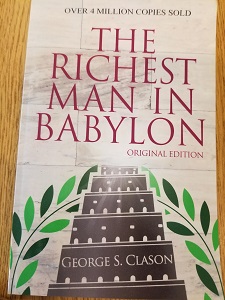
Photo credit: jb
This article is Part Seven in our series of the lessons from George S. Clason’s bestseller The Richest Man in Babylon. If you’d like to go back to the beginning and catch up on the earlier lessons, you can start with the first article in the series by clicking this link.
The Camel Trader of Babylon
In chapter 8, we are introduced to Tarkad, a young fellow who has fallen upon hard times. He owes money to literally everyone he knows, and cannot even come up with enough money to buy a simple meal to keep from starving. He considers stealing some food, but his forays into theft in the past have taught him the lesson that that is not the way to go. So he finds himself hanging around outside an inn, hoping that he’ll see a friendly face among the folks coming in to dine at the inn. Instead, he finds Dabasir, the wealthy camel trader, to whom Tarkad owes a small amount of money (of course!).
Dabasir asks Tarkad for the repayment, to which Tarkad explains he has suffered much misfortune, and as such does not have the money to repay him. Dabasir rebukes his excuse, but then invites Tarkad to join him in the eating-house so that he might tell him a tale.
The tale, boiled down, is of how Dabasir had at one time been subject to slavery in his youth. Through wanton spending and living for the day, he became so heavily in debt that he could not only not pay the debts, he could no longer support his wife. She left him and went back to live with her father.
After a time, Dabasir could find no gainful employment and took to a life of robbery. As you might expect, his success there was short-lived, and he was caught and enslaved. It might not seem so, but this is where good fortune shone on young Dabasir: he happened to be sold to a man who required him to attend to his wife’s camels. This wife, Sira, notices that Dabasir is not like the other slaves, much the same as she was not like the master’s other wives. Sira then approaches Dabasir with a life-changing question: “Do you have the soul of a slave, or the soul of a free man? If a man has within him the soul of a free man, will he not become respected and honored in his own city in spite of his misfortune?”
Pondering these words, Dabasir becomes determined to face up to his debts, become respected and honored, and truly live the life of a free man. Fortune worked in his favor again, as Sira helped him to escape from his slavery – but his journey back to his homeland was very difficult… many times he wanted to give up and die. Over and over he told himself that the soul of a slave would give up and allow the winds of circumstance to direct him – but a free man would stand up for himself, and through sheer determination make his way through the difficulties, to get back to Babylon and face his debtors. Of course he did, and over time paid off all of his debts, and became a respected and honored man in his own country. The details of just how Dabasir paid off his debts are covered in the next section of the book.
Lesson: Self-pity and allowing the circumstances to direct your life are the actions of a man or woman with the soul of a slave. Taking charge of those circumstances in your life, taking action when action is needed, are the ways of a man or woman with a free soul. The only way to make yourself successful is to take on the mantle of the free man’s soul, having the courage and determination to be accountable and, eventually honored and respected.
The next chapter “The Clay Tablets From Babylon” outlines Dabasir’s specific methods for retiring his debt obligations. It is presented as if the old camel trader had written it all out on clay tablets, which have been found in the modern day.


 Sterling Raskie, MSFS, CFP®, ChFC®
Sterling Raskie, MSFS, CFP®, ChFC® The latest in our Owner’s Manual series, A 401(k) Owner’s Manual, was published in January 2020 and is available on
The latest in our Owner’s Manual series, A 401(k) Owner’s Manual, was published in January 2020 and is available on  A Medicare Owner’s Manual, is updated with 2020 facts and figures. This manual is available on
A Medicare Owner’s Manual, is updated with 2020 facts and figures. This manual is available on  Social Security for the Suddenly Single can be found on Amazon at
Social Security for the Suddenly Single can be found on Amazon at  Sterling’s first book, Lose Weight Save Money, can be
Sterling’s first book, Lose Weight Save Money, can be  An IRA Owner’s Manual, 2nd Edition is available for purchase on Amazon. Click the link to choose the
An IRA Owner’s Manual, 2nd Edition is available for purchase on Amazon. Click the link to choose the  Jim’s book – A Social Security Owner’s Manual, is now available on Amazon. Click this link for the
Jim’s book – A Social Security Owner’s Manual, is now available on Amazon. Click this link for the  And if you’ve come here to learn about queuing waterfowl, I apologize for the confusion. You may want to discuss your question with Lester, my loyal watchduck and self-proclaimed “advisor’s advisor”.
And if you’ve come here to learn about queuing waterfowl, I apologize for the confusion. You may want to discuss your question with Lester, my loyal watchduck and self-proclaimed “advisor’s advisor”.